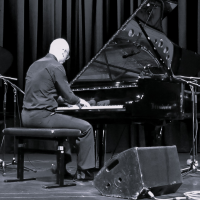Home » Jazz Musicians » Scott Joplin
Scott Joplin
Scott Joplin personified ragtime; he was its chief champion, the figure most closely associated with its composition. It was Joplin's short, hard-driving melodies- -and the syncopated backbone he furnished them—that helped define the musical parameters of ragtime, a style that gave voice to the African American experience during the late 19th and early 20th centuries.
Sadly, for all his accomplishments in putting a new musical form on the map, Joplin spent his final years madly obsessed with a fruitless crusade to enter, if not conquer, another arena: opera, the staid, classical venue accepted by a white community that had for so long ridiculed ragtime as cheap, vulgar, and facile black music.
Many of the details of Joplin's life, like much of his music, have been lost to history. He was born November 24, 1868, in Texarkana, a small city straddling the border of Texas and Arkansas. Joplin's father, Giles, was a railroad laborer who was born into slavery and obtained his freedom five years before his son's birth. Florence Givens Joplin was a freeborn black woman who worked as a laundress and cared for her children. Like many in the black community, the Joplins saw in music a rewarding tool of expression, and the talented family was sought out to perform at weddings, funerals, and parties.
Scott, whose first foray into the world of scales and half notes came on the guitar, discovered a richer lyrical agent in his neighbor's piano. At first, Giles Joplin was concerned that music would sidetrack his son from a solid, wage-earning trade, but he soon saw the clear inventive genius in Scott, who, by the time he was 11, was playing and improvising with unbelievable smoothness. A local German musician, similarly entranced with Scott Joplin's gift, gave the boy free lessons, teaching him the works of European composers, as well as the nuts and bolts of musical theory and harmony.
In a move not uncommon for young blacks at the time, Joplin left home in his early teens, working as an itinerant pianist at honky-tonks and salons of the Midwest, South, and Southwest. Although some revisionist historians have placed the birth of ragtime at the feet of white composers, such as Irving Berlin, who published "Alexander's Ragtime Band" in 1911, the true origin of the music was to be found in these low rent musical halls. In explaining the black roots of the musical form, Rudi Blesh and Harriet Janis wrote in They All Played Ragtime, "Piano ragtime was developed by the Negro from folk melodies and from the syncopations of the plantation banjos. As it grew, it carried its basic principle of displaced accents played against a regular meter to a very high degree of elaboration." The signature fast and frenetic pace of ragtime reflected the jubilant side of the black experience—compared with the melancholy-heavy blues—and the music became, according to Blesh and Janis, America's "most original artistic creation."
Read moreTags
Jazz this week: Kneebody, a tribute to Scott Joplin, "Sculptures in Sound," and more

Source:
St. Louis Jazz Notes by Dean Minderman
This week's calendar of live jazz and creative music in St. Louis offers a century-spanning variety of sounds, ranging from a tribute to legendary composer who helped lay the foundation for jazz to a group offering their own contemporary version of a musical melting pot. Let's go to the highlights... Wednesday, March 29 The eclectic electro-acoustic fusion quintet Kneebody performs for the first of four nights continuing through Saturday at Jazz at the Bistro. The group is touring in support ...
read more
Jazz This Week: Rick Haydon Quartet, Terence Blanchard, Ragtime at Scott Joplin's House, Oikos Ensemble, and More

Source:
St. Louis Jazz Notes by Dean Minderman
If you're looking to get out hear some live jazz in St. Louis, there's there's plenty of local music on tap over the weekend, with some new weekly gigs getting underway, plus some visiting players coming to town to play free concerts next week. Let's go to the highlights: Tonight, singer Joe Mancuso and his band begin a new weekly Thursday gig at Cafe Eau in the Chase Park Plaza Hotel, and Miss Jubilee performs downtown at Thaxton Speakeasy. On ...
read more
Scott Joplin House to Host Free Ragtime Concert on Wednesday, June 12

Source:
St. Louis Jazz Notes by Dean Minderman
The Scott Joplin House State Historic Site and the Friends of Scott Joplin will present a free concert of ragtime music from 4:00 p.m. to 7:00 p.m. Wednesday, June 12 in the New Rosebud Cafe at the Scott Joplin House State Historic Site (pictured), 2658 Delmar at Beaumont. The event will feature performers drawn from the lineups of this year's Scott Joplin Ragtime Festival, to be held June 5 - 8 in Sedalia, and the Blind Boone Ragtime and Early ...
read more
American Classics Performing Songs of Scott Joplin at Longy School in Cambridge on Saturday May 7

Source:
MassJazz: Jazz in Massachusetts
American Classics—a Boston group dedicated to exploring the time-capsule of original American music—is performing a special concert on the Rags and Songs of Scott Joplin at Pickman Concert Hall at Longy School of Music, on Saturday, May 7, 2011 at 7:30 p.m. Tickets to the show are $20 and can be purchased online or at the door. The hall is located at 27 Garden Street in Cambridge, Massachusetts. Joplin, who founded and perfected ragtime music, wrote over 40 ragtimes as ...
read more
When Scott Met Irving ... or Didn't

Source:
Michael Ricci
ITS one of Mark Saltzmans favorite moments in his play with music, The Tin Pan Alley Rag, and he wont even take the credit.
Near the end of the show, which imagines a meeting between the composers Scott Joplin and Irving Berlin, Joplin responds to a painful memory by playing “Bethena", a ragtime waltz he wrote in 1905. And when he plays, nothing else happens. There are no words, no dances, no set changes. Theres just the sound of a ...
read more
Jazz at the Bistro, Scott Joplin House Named in Article on "Nine Great Jazz Joints"

Source:
St. Louis Jazz Notes by Dean Minderman
St. Louis' Jazz at the Bistro and the Scott Joplin House State Historic Site are among the music venues cited in “Nine Great Jazz Joints," an article appearing in the current issue of Budget Travel magazine and online at CNN.com. The magazine asked six musicians to name some of their favorite spots to hear jazz, and St. Louis native and multi-reedman J.D. Parran nominated the Bistro and the Joplin house. The article also offers the recommendations of baritone ...
read more


























